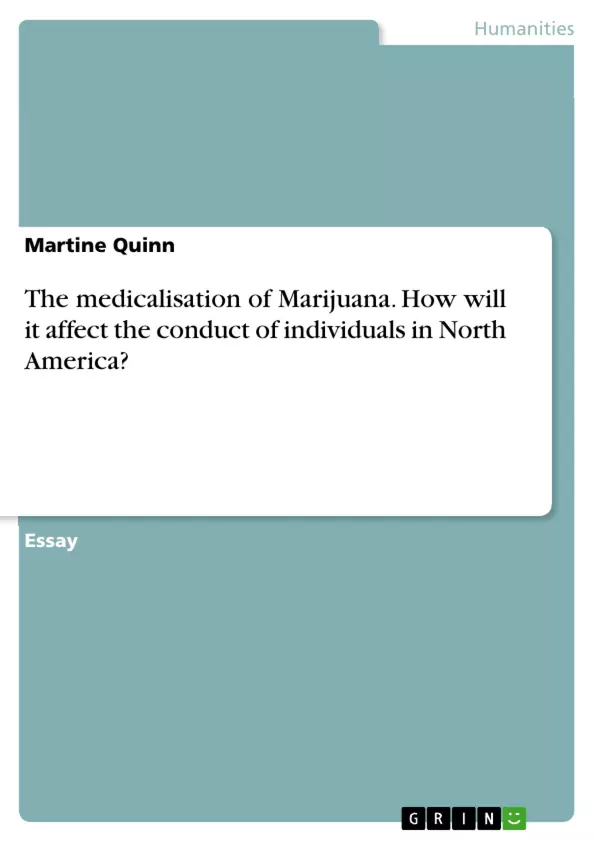This essay critically explores how the Medicalization of Marijuana is transforming the conduct of individuals and social worlds in contemporary North America, and argues that marijuana is being deregulated for capital gain in which the state is gaining a potent form of social control.
Social control will be used as the power to have a particular set of definitions of the world realized in both spirit (laws, moral codes, customs, habits) and through conduct. This RQ shows the structure/agency debate that sociologist Alan Dawe (1970) refers to this dualism as the ‘two sociologies’. That is one concerned with structure and structural constraint the other with individual action and agency.
Inhaltsverzeichnis (Table of Contents)
- How will the Medicalization of Marijuana affect the conduct of individuals in contemporary North America?
- The Medicalization of Marijuana and its Impact on Individuals and Society
- Governmental Power and the Manipulation of Conduct
- The Influence of Neoliberal Governmentality on Marijuana Use
- The Limitations of Individual Agency in a Neoliberal Context
- The Illusion of Agency within Liberal/Neoliberal Thought
- The Shift from Criminalization to Medicalization: A New Form of Social Control
- The Role of Government in Regulating Marijuana Use
- The Socialization Process and the Shifting Definition of Marijuana Use
- The Power of Discourse and the Limitation of Individual Agency
- Agency and the Concept of Agencement
- The Implications of Medicalization for Individual Conduct
- Conclusion
Zielsetzung und Themenschwerpunkte (Objectives and Key Themes)
This essay critically examines the impact of marijuana medicalization on individual conduct and social worlds in contemporary North America. It argues that marijuana deregulation is driven by capital gain, allowing the state to gain a powerful form of social control.- The medicalization of marijuana as a social control mechanism
- The role of neoliberal governmentality in shaping individual conduct
- The interplay of structure and agency in relation to marijuana use
- The limitations of individual agency within the context of medicalization
- The influence of power and knowledge on the definition of marijuana use
Zusammenfassung der Kapitel (Chapter Summaries)
- This chapter explores the medicalization of marijuana in North America and its implications for individual conduct. It argues that the state is using marijuana deregulation as a means of social control. The chapter draws upon the theories of Conrad & Schneider (1980), Foucault (1977), and Bourdieu (1970) to explain the mechanisms of social control and the influence of power on the definition of deviance.
- This chapter examines the role of neoliberal governmentality in shaping the conduct of individuals in relation to marijuana use. It argues that the state is using techniques of surveillance and control to regulate and manage behavior. The chapter analyzes Foucault's theory of governmentality and the concept of bio-power to illustrate how the state can influence the conduct of its citizens through subtle means.
- This chapter explores the relationship between individual agency and the medicalization of marijuana. It argues that the state's control over the medicalization process limits individual agency and creates the illusion of individual freedom. The chapter discusses the concept of "Homo economicus" and the limitations of classical liberal thought in understanding the influence of power on individual behavior.
- This chapter examines the shifting definitions of marijuana use from criminalized to medicalized. It argues that both criminalization and medicalization are mechanisms for social control that serve the interests of the state. The chapter analyzes the work of Thomas Szasz (1974) to highlight the dangers of government control over individual behavior.
- This chapter explores the impact of the medicalization of marijuana on the socialization process of individuals. It examines how individuals adapt their language and behavior to conform to the new definitions of marijuana use. The chapter draws upon empirical evidence from qualitative research conducted by O'Brien (2013) to illustrate the changing dynamics of social interaction.
- This chapter examines the power of discourse in shaping the definition of marijuana use. It argues that both proponents and opponents of marijuana use are using discourses that limit the possibilities of individual agency. The chapter explores the concept of Actor-Network Theory (ANT) and its implications for understanding the relationship between power, knowledge, and individual agency.
- This chapter explores the concept of agencement as it relates to the medicalization of marijuana. It argues that agency is not a property of individuals but rather a product of interactions between people, things, and institutions. The chapter examines the role of the marijuana dispensary as an example of agencement and its influence on individual behavior.
Schlüsselwörter (Keywords)
This essay examines the medicalization of marijuana, neoliberal governmentality, social control, individual agency, bio-power, discourse, and the concept of agencement. It focuses on the relationship between power, knowledge, and individual behavior in the context of contemporary North America.Frequently Asked Questions
What is the central argument regarding the medicalization of marijuana?
The essay argues that the shift from criminalization to medicalization is a new form of social control driven by capital gain, allowing the state to regulate individual conduct more subtly.
How does neoliberal governmentality affect marijuana use?
The state uses techniques of surveillance and "bio-power" to manage behavior, influencing how citizens perceive and use marijuana within a regulated framework.
What is the 'structure vs. agency' debate in this context?
It explores whether individuals have true freedom (agency) to use marijuana or if their choices are strictly limited by societal and legal structures (structural constraint).
What role do dispensaries play in individual behavior?
Dispensaries are viewed as an example of "agencement," where agency is produced through the interaction between people, institutions, and objects to shape conduct.
How does language change with medicalization?
Individuals adapt their discourse and behavior to conform to medical definitions, moving away from "deviant" or "criminal" labels to "patient" identities.
- Quote paper
- Martine Quinn (Author), 2016, The medicalisation of Marijuana. How will it affect the conduct of individuals in North America?, Munich, GRIN Verlag, https://www.grin.com/document/345183



